

How to Take Notes in Class: The 5 Best Methods - College Info Geek. Dunning-Kruger Effect: When Distorted Self-Perception and Illusions of Competence Trick Entertainers, Politicians, and Cities. American Idol (Photo credit: Wikipedia) Steve Mensing, Editor ♦While many have not heard of the Dunning-Kruger Effect, no doubt more than a few of us have watched those shows starting a new season of American Idol.
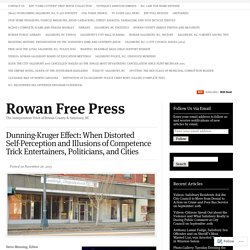
You know the ones where people, with no talent or skill at singing, grab center stage and draw eye-rolls and muted chuckles from the judges. Surely we’ve seen wannabe politicians become baffled when someone questions them about a major issue. Even some municipalities are said to suffer from inflated self-perception. The Dunning-Kruger Effect is the extreme bias that some untalented and unskilled persons suffer from when they rate their ability at a much higher level than it actually is.
Back in 1999 David Dunning and Justin Kruger tested the Dunning-Kruger Effect in a series of experiments at Cornell University. . • Tend to overestimate their own level of skill. • Tend to recognize the extremity of their inadequacy. • Fail to recognize genuine skill in others. Like this: Memories of errors foster faster learning. Using a deceptively simple set of experiments, researchers at Johns Hopkins have learned why people learn an identical or similar task faster the second, third and subsequent time around.
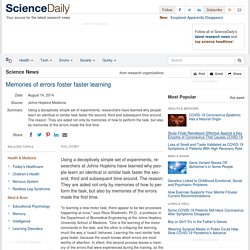
The reason: They are aided not only by memories of how to perform the task, but also by memories of the errors made the first time. "In learning a new motor task, there appear to be two processes happening at once," says Reza Shadmehr, Ph.D., a professor in the Department of Biomedical Engineering at the Johns Hopkins University School of Medicine. "One is the learning of the motor commands in the task, and the other is critiquing the learning, much the way a 'coach' behaves. Learning the next similar task goes faster, because the coach knows which errors are most worthy of attention. This Is Your Brain on Writing. Scholars Turn Their Attention to Attention - The Chronicle of Higher Education. Imagine that driving across town, you've fallen into a reverie, meditating on lost loves or calculating your next tax payments.
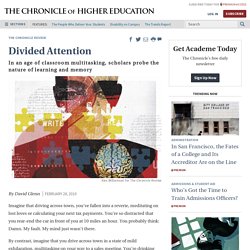
You're so distracted that you rear-end the car in front of you at 10 miles an hour. You probably think: Damn. My fault. My mind just wasn't there. By contrast, imagine that you drive across town in a state of mild exhilaration, multitasking on your way to a sales meeting. That illusion of competence is one of the things that worry scholars who study attention, cognition, and the classroom. "Heavy multitaskers are often extremely confident in their abilities," says Clifford I.
Indeed, last summer Nass and two colleagues published a study that found that self-described multitaskers performed much worse on cognitive and memory tasks that involved distraction than did people who said they preferred to focus on single tasks. Experiments like that one have added fuel to the perpetual debate about whether laptops should be allowed in classrooms. Wait a minute. The Interleaving Effect: Mixing It Up Boosts Learning. We’ve all heard the adage: practice makes perfect!
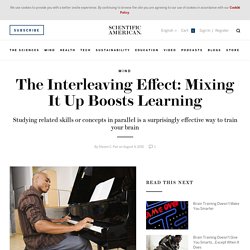
In other words, acquiring skills takes time and effort. But how exactly does one go about learning a complex subject such as tennis, calculus, or even how to play the violin? An age-old answer is: practice one skill at a time. A beginning pianist might rehearse scales before chords. A young tennis player practices the forehand before the backhand. However another strategy promises improved results. Over the past four decades, a small but growing body of research has found that interleaving often outperforms blocking for a variety of subjects, including sports and category learning. The first signs of interleaving’s promise appeared in the domain of motor skills. Foreign language studies however suggest that the effectiveness of interleaving comes with an important caveat.
The First 20 Hours - How to Learn Anything: Josh Kaufman at TEDxCSU. Learning Theories, Learning Models, Learning Theory Summaries - in Plain English! Explore the Brain and Mind - BrainFacts.org.
The lesson you never got taught in school: How to learn! A paper published in Psychological Science in the Public Interest evaluated ten techniques for improving learning, ranging from mnemonics to highlighting and came to some surprising conclusions.
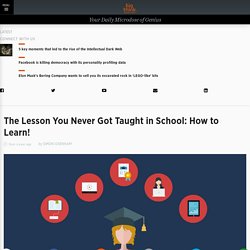
The report is quite a heavy document so I’ve summarised the techniques below based on the conclusions of the report regarding effectiveness of each technique. Be aware that everyone thinks they have their own style of learning (they don't, according to the latest research), and the evidence suggests that just because a technique works or does not work for other people does not necessarily mean it will or won’t work well for you.
If you want to know how to revise or learn most effectively you will still want to experiment on yourself a little with each technique before writing any of them off. Elaborative Interrogation (Rating = moderate) A method involving creating explanations for why stated facts are true.